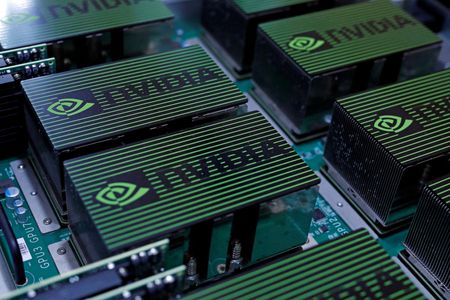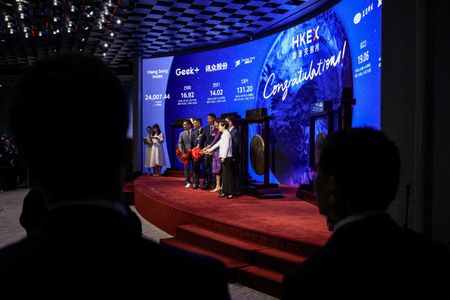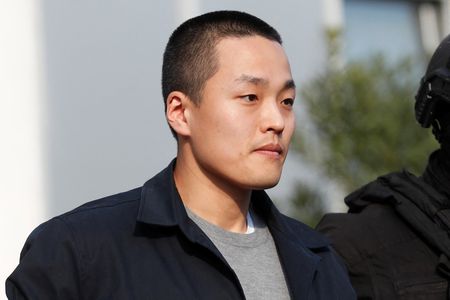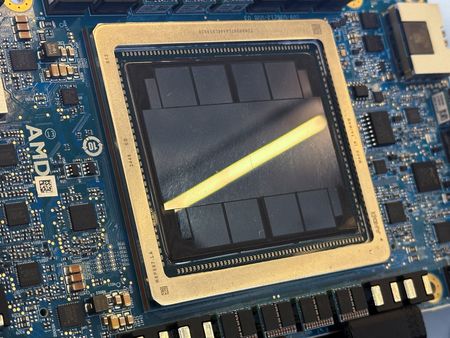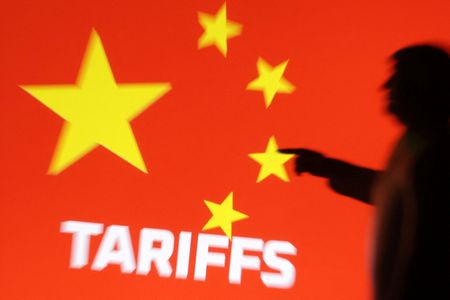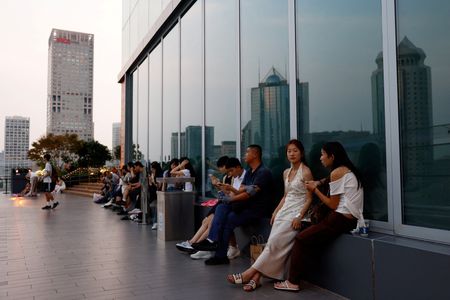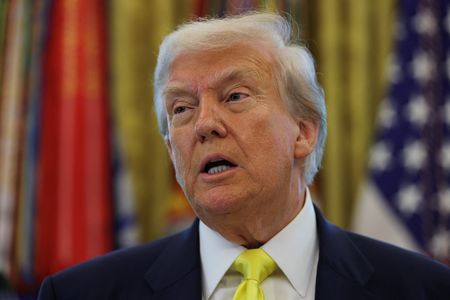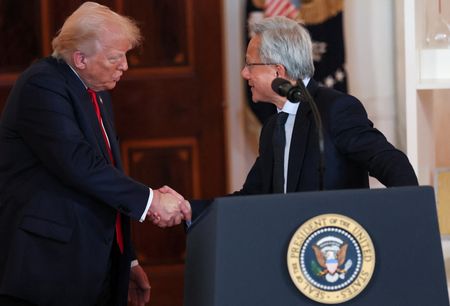By Karen Freifeld, Arsheeya Bajwa, Trevor Hunnicutt and Alexandra Alper
(Reuters) -U.S. President Donald Trump on Monday suggested he might allow Nvidia to sell a scaled-down version of its next-generation advanced GPU chip in China, despite deep-seated fears in Washington that China could harness U.S. artificial intelligence capabilities to supercharge its military.
The move could open the door to China securing more advanced computing power from the U.S. even as the two countries battled for technology supremacy, critics said.
“Jensen (Huang, Nvidia CEO) also has the new chip, the Blackwell. A somewhat enhanced-in-a-negative-way Blackwell. In other words, take 30% to 50% off of it,” Trump told reporters in an apparent reference to slashing the chip’s computing power.
“I think he’s coming to see me again about that, but that will be an unenhanced version of the big one,” he added.
Earlier, the Trump administration confirmed an unprecedented deal with Nvidia and AMD to give the U.S. government 15% of revenue from sales of some advanced chips in China.
The move sent shivers across Washington, where China hawks of both parties have long sought to keep Beijing generations behind U.S. AI technology.
“Even with scaled-down versions of flagship Nvidia (chips), China could spend and buy enough of them to build world-leading, frontier-scale AI supercomputers,” said Saif Khan, former director of Technology and National Security at the White House National Security Council under former President Joe Biden, who heavily restricted U.S. AI chip exports abroad. “This could directly lead to China leapfrogging America in AI capabilities.”
Reuters in May reported that Nvidia was preparing a new chip for China that was a variant of its most recent state-of-the-art AI Blackwell chips at a significantly lower cost.
Nvidia has not disclosed the existence of the chip, or its capabilities compared with its U.S. offerings. But the flagship U.S. version of the Blackwell chip, which Nvidia unveiled in March, is up to 30 times faster than its predecessor.
‘OBSOLETE’
Trump on Monday defended the agreement calling for Nvidia and AMD to give the U.S. government 15% of revenue from China sales, after his administration green-lighted exports to China of less advanced AI chips known as the H20 last month.
The Trump administration halted sales of Nvidia’s H20 chips to China in April, but the company said last month it had won clearance to resume shipments and hoped to start deliveries soon.
“The H20 is obsolete,” Trump said on Monday, arguing China already had it. “So I said, ‘Listen, I want 20% if I’m going to approve this for you, for the country.'”
The deal is extremely rare for the United States and marks Trump’s latest intervention in corporate decision-making, after pressuring executives to invest in American manufacturing and demanding the resignation of Intel’s new CEO, Lip-Bu Tan, over his ties to Chinese companies.
The U.S. Commerce Department has started issuing licenses for the sale of H20 chips to China, a U.S. official said on Friday. Washington does not feel the sale of H20 and equivalent chips compromises national security, a second U.S. official told Reuters on Sunday.
The second official did not know when or how the agreement with the chip companies would be implemented but said the administration would be in compliance with the law.
When asked if Nvidia had agreed to pay 15% of revenue to the U.S., a company spokesperson said: “We follow rules the U.S. government sets for our participation in worldwide markets.”
“While we haven’t shipped H20 to China for months, we hope export control rules will let America compete in China and worldwide,” the spokesperson added.
A spokesperson for AMD said the U.S. approved its applications to export some AI processors to China, but did not directly address the revenue-sharing agreement and said the company’s business adheres to all U.S. export controls.
China’s foreign ministry said the country has repeatedly stated its position on U.S. chip exports. The ministry has previously accused Washington of using technology and trade measures to “maliciously contain and suppress China.”
(Reporting by Karen Freifeld in New York; Additional reporting by Arsheeya Bajwa, Yazhini MV and Gnaneshwar Rajan in Bengaluru, Liam Mo and Che Pan in Beijing, Trevor Hunnicutt, Ryan Jones and Alexandra Alper in Washington and Stephen Nellis in San Francisco; Editing by Kenneth Li, Sayantani Ghosh, Marguerita Choy and Matthew Lewis)

